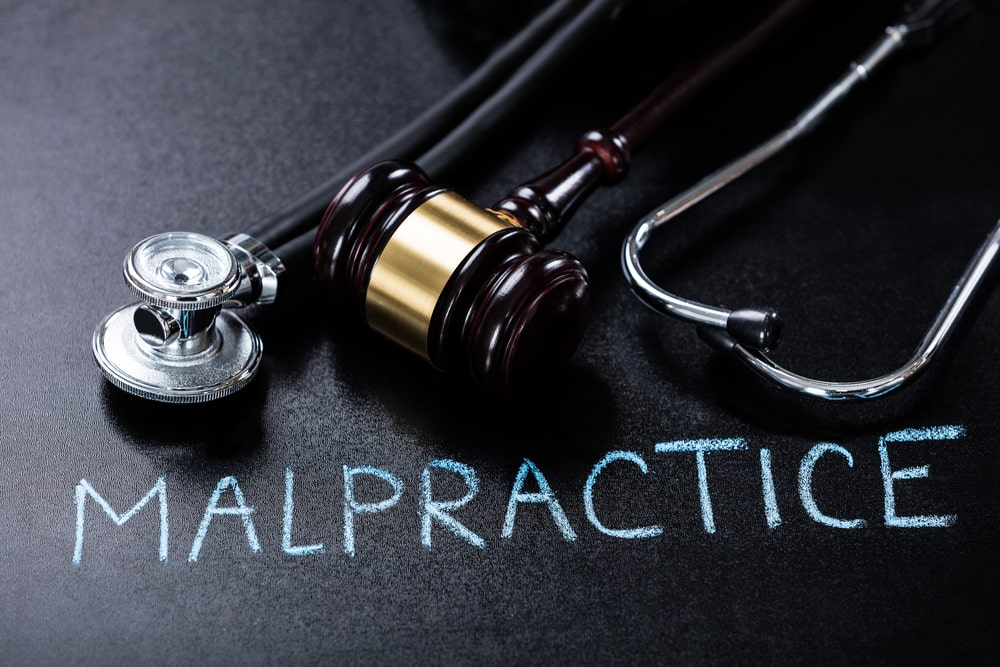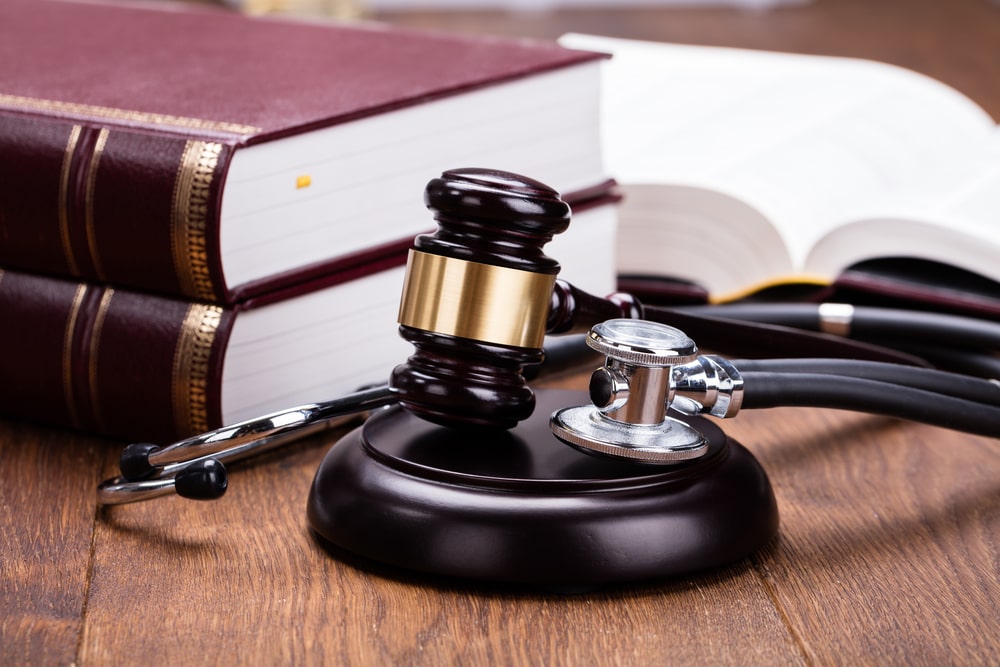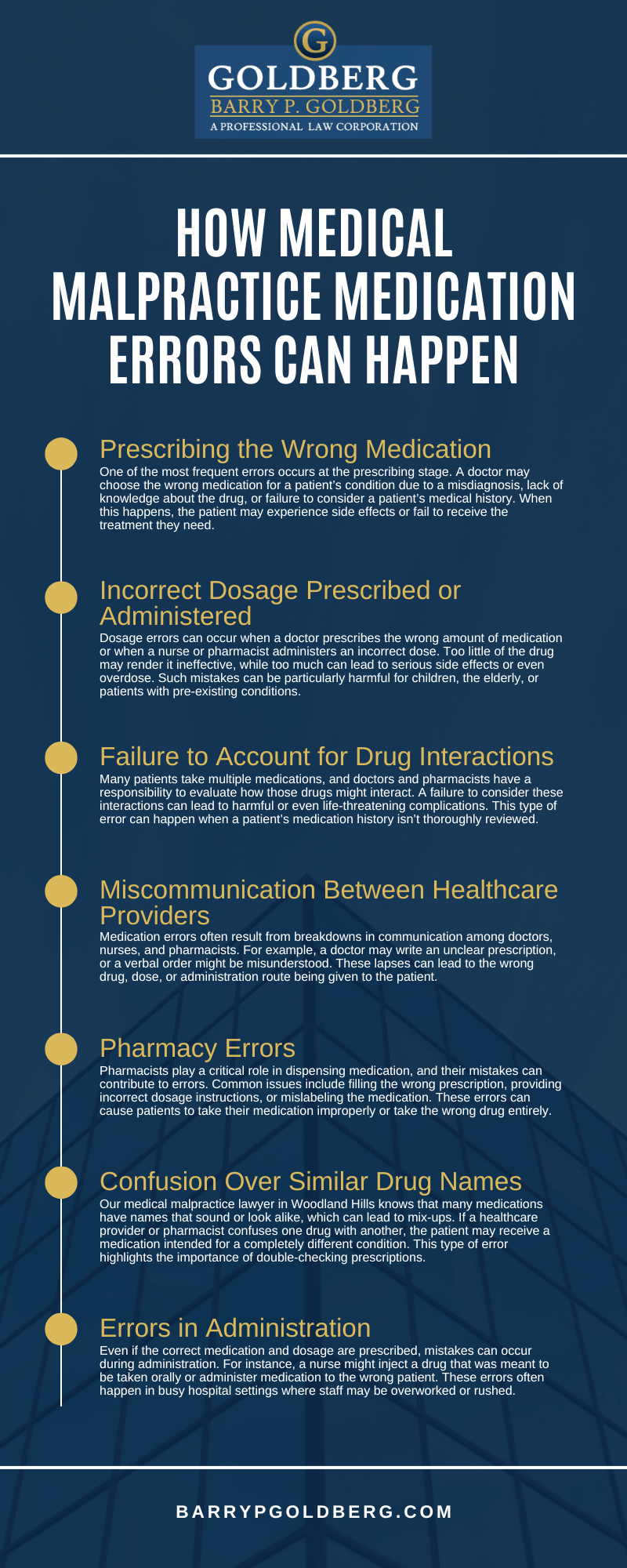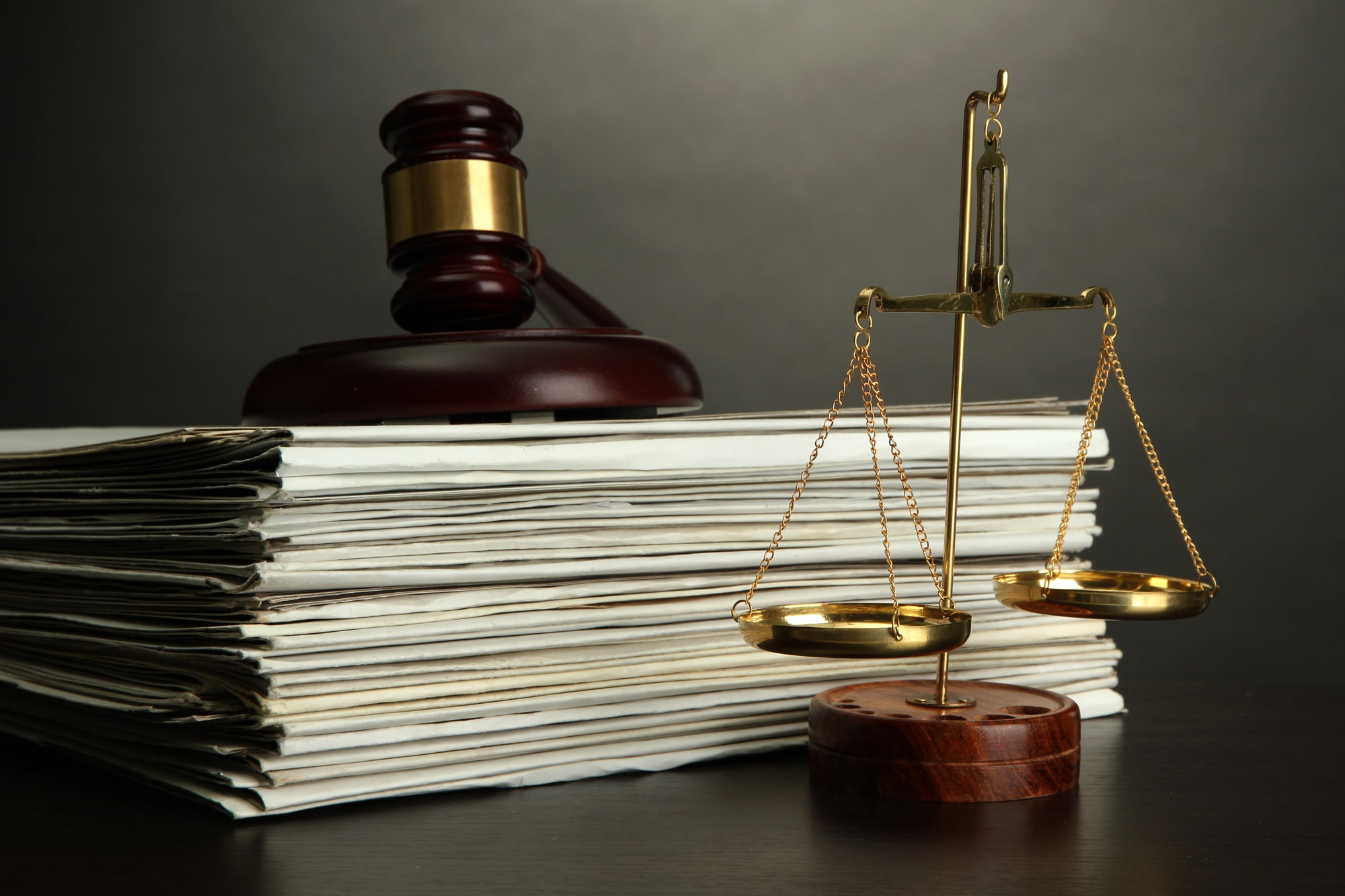
When doctors or other medical professionals commit serious mistakes or oversights that negatively impact a patient’s health, they may be held liable for how that person suffered. While we visit doctors to cure our ailments and expect to feel better, not worse, sometimes this isn’t the case. Doctors may prescribe the wrong medication, recommend a treatment plan that doesn’t work, ignore a patient’s expressed concerns, not make the right conclusion based on symptoms, and much more. If you feel that your doctor did not do something as they should have in regards to your care, then it is worth speaking with our Woodland Hills, CA medical malpractice lawyer about whether medical malpractice has in fact happened to you. Patients may be owed compensation for the repercussions of a doctor’s mistake.
Key Elements Of Medical Malpractice
To have grounds for filing a medical malpractice case against a doctor or medical facility, there are key elements that must be present. Firstly, the doctor must have owed a duty to your care. This can be easily proven by showing that the doctor and you both had the awareness and intent for them to provide you with care. Secondly, it must be shown that the doctor had breached this duty through a mistake or oversight. Thirdly, the error must have resulted in an injury, worsened condition, or fatality. Lastly, there must have been financial damages that were incurred because of the breach and mistake. Medical malpractice cases aim to hold the medical professional accountable while giving the patient (or surviving loved ones in cases of wrongful death) compensation for what they endured.
Examples Of Mistakes Or Oversights
With medical malpractice cases, there is oftentimes a mistake or oversight that was committed by the doctor. A mistake is an error that they made, and an oversight is when they failed to notice pertinent information that led to the patient’s harm. Examples of ways that a doctor may fail to provide proper care can be related to prescription medication, surgery, treatment plans, diagnosis, informed consent, being dismissive of concerns or questions, inadequate staffing, and contradicting opinions between medical professionals. Our dedicated medical malpractice attorney may suggest getting a second opinion from another doctor at another medical facility entirely. This is to compare the differences between each doctor, which could point to what the first doctor had done wrong.
Goldberg Injury Lawyers
At Goldberg Injury Lawyers, we understand the severity of medical malpractice cases. Innocent people can become victims at the hands of a negligent doctor. If you suspect that something went awry with your care, then we encourage you to speak with our CA medical malpractice attorney about a potential case. We can evaluate what has happened and let you know if the key elements for taking legal action are present. You can rely on us to guide you every step of the way. We are ready to come to your side today. Please do not hesitate to reach out for assistance.
Filing A Medical Malpractice Claim After Surgical Errors
Our Woodland Hills, CA medical malpractice lawyer understands that experiencing a surgical error can have life-altering consequences. When a surgery doesn’t go as planned due to a mistake by the medical team, the impacts can affect a person’s physical health, financial stability, and overall quality of life. Filing a medical malpractice claim after a surgical error can help patients hold responsible parties accountable and potentially recover compensation for the harm caused.
What Defines A Surgical Error
A surgical error is a preventable mistake made during surgery that goes beyond a recognized risk. While all surgeries carry some level of risk, surgical errors occur when the medical team makes a critical error, such as operating on the wrong body part, leaving a surgical instrument inside the patient, or causing unintended damage to nearby organs or tissues. These mistakes often arise from negligence, miscommunication, or improper procedures, and they can lead to additional surgeries, long-term complications, or even life-threatening conditions.
For a claim to succeed, we must establish that the surgical error was preventable and directly linked to negligence. This requires showing that the surgeon or medical staff deviated from the expected standard of care, meaning they did not act in a way that a reasonably competent professional would have under similar circumstances.
The Process Of Filing A Malpractice Claim After A Surgical Error
When filing a medical malpractice claim after a surgical error, there are several steps we take to build a compelling case. First, we gather detailed medical records, including pre-operative and post-operative reports, which allow us to verify what went wrong during the procedure. In many cases, we work with experienced medical professionals to review the records and determine whether the surgeon or medical team deviated from standard practices. This evidence is critical to showing that the error was avoidable and that it caused direct harm to the patient.
Additionally, there are strict deadlines, known as statutes of limitations, for filing medical malpractice claims. These deadlines vary by state, and failing to file a claim on time can prevent recovery. It’s important to act promptly to allow time for a thorough investigation and case preparation. By preparing and filing a claim on time, we help ensure that the affected individual has the best opportunity to seek compensation.
Proving Negligence In Surgical Error Cases
Our medical malpractice lawyer in Woodland Hills knows that a successful claim must establish that the surgical error was due to negligence. To prove negligence, we must demonstrate four elements: duty of care, breach of duty, causation, and damages. Duty of care means the medical team had a responsibility to follow the accepted standard of care. Breach of duty occurs when they fail to meet this standard. Causation connects this breach to the injury, and damages refer to the resulting harm or financial losses.
Compensation In Surgical Error Claims
Filing a malpractice claim after a surgical error may allow patients to seek compensation for various types of damages, both economic and non-economic. Economic damages cover quantifiable losses, such as medical bills and lost wages. Non-economic damages address intangible harm, including pain, suffering, and diminished quality of life. In some instances, punitive damages may be awarded to penalize particularly reckless or harmful actions by the healthcare provider.
Get The Support You Need
If you or a loved one has been harmed by a surgical error, we at Goldberg Injury Lawyers are here to guide you through every step of the process. Surgical errors are serious events that deserve attention, accountability, and compensation when negligence is involved. Please call us to schedule a free consultation. Our experienced team is dedicated to helping you understand your options and supporting you throughout your claim. Contact our CA medical malpractice lawyer today to discuss your case, and let us help you get the support you need.

How Medical Malpractice Medication Errors Can Happen
As our Woodland Hills, CA medical malpractice lawyer can tell you, medication errors are a common form of medical malpractice, often leading to serious health consequences. These mistakes can happen at any stage of the medication process, from prescribing to administering the drug. By understanding how these errors occur, we can better identify when malpractice may have played a role. When it comes to medical malpractice, you want to make sure you are getting a lawyer who focuses on you and maximizing your reward, not maximizing the speed of your lawyer’s paycheck. So call the office now.
- Prescribing the Wrong Medication. One of the most frequent errors occurs at the prescribing stage. A doctor may choose the wrong medication for a patient’s condition due to a misdiagnosis, lack of knowledge about the drug, or failure to consider a patient’s medical history. When this happens, the patient may experience side effects or fail to receive the treatment they need.
- Incorrect Dosage Prescribed or Administered. Dosage errors can occur when a doctor prescribes the wrong amount of medication or when a nurse or pharmacist administers an incorrect dose. Too little of the drug may render it ineffective, while too much can lead to serious side effects or even overdose. Such mistakes can be particularly harmful for children, the elderly, or patients with pre-existing conditions.
- Failure to Account for Drug Interactions. Many patients take multiple medications, and doctors and pharmacists have a responsibility to evaluate how those drugs might interact. A failure to consider these interactions can lead to harmful or even life-threatening complications. This type of error can happen when a patient’s medication history isn’t thoroughly reviewed.
- Miscommunication Between Healthcare Providers. Medication errors often result from breakdowns in communication among doctors, nurses, and pharmacists. For example, a doctor may write an unclear prescription, or a verbal order might be misunderstood. These lapses can lead to the wrong drug, dose, or administration route being given to the patient.
- Pharmacy Errors. Pharmacists play a critical role in dispensing medication, and their mistakes can contribute to errors. Common issues include filling the wrong prescription, providing incorrect dosage instructions, or mislabeling the medication. These errors can cause patients to take their medication improperly or take the wrong drug entirely.
- Confusion Over Similar Drug Names. Our medical malpractice lawyer in Woodland Hills knows that many medications have names that sound or look alike, which can lead to mix-ups. If a healthcare provider or pharmacist confuses one drug with another, the patient may receive a medication intended for a completely different condition. This type of error highlights the importance of double-checking prescriptions.
- Errors in Administration. Even if the correct medication and dosage are prescribed, mistakes can occur during administration. For instance, a nurse might inject a drug that was meant to be taken orally or administer medication to the wrong patient. These errors often happen in busy hospital settings where staff may be overworked or rushed.
Take Action If You’ve Suffered From A Medication Error
Medication errors can have devastating consequences, but victims don’t have to face the aftermath alone. When healthcare providers fail to meet their obligations, they should be held accountable. At Goldberg Injury Lawyers, we are dedicated to helping you understand your options and pursue the justice and compensation you deserve. We have locations throughout parts of California to make meeting and working with our team as easy as possible. Contact our medical malpractice lawyer in Woodland Hills today to learn how we can assist you in your case.
Woodland Hills Medical Malpractice Infographic


How To Recognize Medical Malpractice
Unfortunately, as our Woodland Hills, CA medical malpractice lawyer knows, medical malpractice can have life-altering consequences, but many people aren’t sure how to identify when a healthcare provider’s actions may have caused harm. At Goldberg Injury Lawyers, we frequently receive questions from individuals wondering if their medical outcome was avoidable and what steps they should take. We advise our clients on the best course of action and how to fight for compensation after medical malpractice. SuperLawyers honored Attorney Goldberg with the “Top 100” list in Southern California and he has earned many other accolades. You can trust him with your case.
What Are Some Signs Of Medical Malpractice?
Medical malpractice isn’t always obvious, but certain red flags can indicate negligence. These include unexpected complications, a lack of informed consent before procedures, or significant delays in diagnosis or treatment. If you’ve experienced worsening symptoms or unexpected results after receiving care, it’s worth evaluating whether your provider followed accepted medical standards.
Does A Poor Outcome Always Mean Malpractice Occurred?
Not necessarily. Medicine is complex, and not every bad outcome is due to malpractice. Our medical malpractice lawyer in Woodland Hills knows that to establish malpractice, there must be evidence that the provider deviated from the standard of care expected in their field and that this directly caused harm. If you’re unsure, consulting a knowledgeable attorney can help determine if you have a valid claim.
How Do I Know If My Diagnosis Was Delayed Or Missed Due To Negligence?
Our medical malpractice lawyer can tell you that a delayed or missed diagnosis might qualify as malpractice if it resulted from a failure to perform appropriate tests, misinterpretation of results, or ignoring patient symptoms. If another competent provider would have diagnosed the condition sooner, the delay could be considered negligent, especially if it led to worse outcomes or more extensive treatment.
What Should I Do If I Suspect Medical Malpractice?
If you think malpractice may have occurred, gather as much information as possible, including your medical records and a timeline of events. It’s also helpful to document your symptoms and any communication with your healthcare providers. This information can be critical in assessing whether malpractice played a role in your situation.
Can I File A Claim If Malpractice Caused Harm To A Loved One?
Yes, you may be able to pursue a claim on behalf of a loved one, such as a child, spouse, or elderly parent, if they were harmed by medical negligence. In cases of wrongful death or incapacity, family members often have the right to seek compensation for damages. An attorney can provide guidance on how to proceed.
Help When You Suspect Medical Malpractice
Recognizing medical malpractice can be challenging, but you don’t have to figure it out alone. If you suspect that negligence caused harm to you or a loved one, Goldberg Injury Lawyers is here to help. With over 35 years of legal practice, you can trust that Attorney Goldberg will have your best interest in mind. Contact our Woodland Hills medical malpractice lawyer today to discuss your concerns and explore your options. We’re ready to stand by your side and work toward the justice you deserve.

